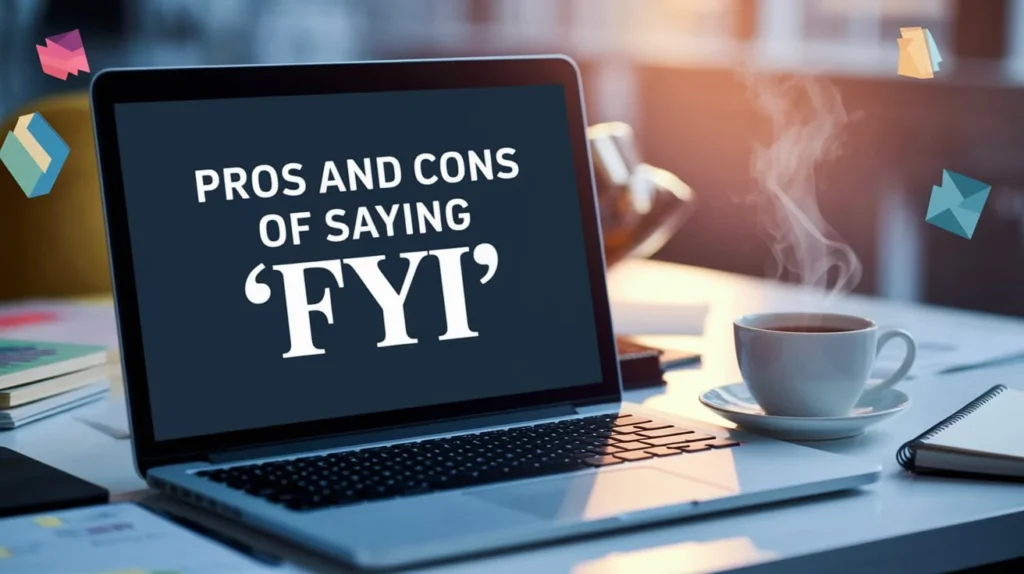Let’s be real—there are so many moments in life when you need to pass on some information quickly, but you want it to feel more personal, engaging, and thoughtful. Sometimes, “FYI” just feels a bit… bland. While it’s handy for sharing something casually, it doesn’t always hit the mark when you want your message to sound warmer or more professional.
So, let’s explore 20 other ways to say “FYI”, each of which can make your message feel more considerate and tailored. Whether it’s for a work email, a casual note, or a more formal communication, you’ve got options that can elevate your tone and keep things friendly, yet effective.
What Does “FYI” Mean?
“FYI” stands for “For Your Information.” It’s a shorthand way to let someone know you’re sharing something they might find useful or important, but it’s not something they necessarily need to respond to. It’s often used in emails, texts, or messages when you want to pass along information without expecting a reply.
It’s quick, to the point, and easy to understand—but sometimes, depending on the context, it can come off as a little too curt or impersonal. So, why not switch things up and add some personality? Let’s dive into some great alternatives to “FYI” that will help you do just that.
Is It Professional/Polite to Say “FYI”?
While “FYI” is perfectly acceptable in many situations, it’s not always the most polite or professional way to share information, especially in more formal settings. It can sometimes feel like you’re giving someone information without much thought, leaving little room for warmth or consideration.
If you’re trying to create a more respectful, engaging tone—or if you’re communicating with someone who prefers more formal language—it’s better to switch to a different phrase. So, let’s see how you can make your messages more thoughtful, without losing that easy, informative vibe.
Pros and Cons of Saying “FYI”

Pros:
- Short and sweet: “FYI” is a quick way to share information without any fluff.
- Casual: It works well in informal conversations or when time is limited.
- Clear: It directly communicates that the information is for their awareness, with no need for further discussion.
Cons:
- Impersonal: Can come across as curt or detached, especially in professional contexts.
- Overused: It might seem lazy or unthoughtful if used too often.
- Lacks warmth: Sometimes, it doesn’t show enough care for the recipient.
Now that we’ve covered the basics of “FYI,” let’s jump into 20 creative alternatives you can use to share information without sounding too robotic.
Synonyms for “FYI”
- Just Wanted to Keep You in the Loop
- Sharing This for Your Information
- Thought You Might Want to Know
- Passing This Along for Your Review
- Here’s an Update for You
- I Thought You Might Find This Interesting…
- Wanted to Pass Along…
- Just Passing This Along…
- For Your Reference…
- For Your Consideration…
- Here’s Something You Might Find Useful…
- Just Giving You the Scoop…
- Here’s a Quick Update…
- Just Letting You Know…
- Thought You Should Be Aware…
- Just A Heads Up…
- Wanted to Share…
- In Case You Missed It…
- Just So You Know…
- For Your Awareness…
1. “Just Wanted to Share…”
This is a friendly, casual way to let someone know you’re passing on something for their awareness. It sounds warmer than just “FYI,” while still being clear and to the point.
Scenario Example:
Subject: Just wanted to share a quick update
Hi [Name],
Just wanted to share this document with you—it has the latest data on the project. Let me know if you have any questions!
Best, [Your Name]
Best Use: Perfect for informal emails or when you want to share something in a light, friendly tone.
Additional Notes: This is a great phrase to use when you want to share something without expecting immediate feedback but still want to sound more engaged.
2. “For Your Awareness…”
This alternative works well when you need to provide information in a slightly more formal way but still want it to feel personal and thoughtful.
Scenario Example:
Subject: For your awareness – new schedule update
Hi [Name],
For your awareness, the team has updated the project deadlines. Please check the attached calendar for the new dates.
Best regards, [Your Name]
Best Use: Ideal for professional environments when you want to give information without it feeling too stiff.
Additional Notes: This phrase sounds more polished than “FYI” but still carries that easygoing, informative tone.
3. “Just a Quick Heads-Up…”
This one’s perfect when you need to give someone a gentle nudge about something coming up. It adds a bit more personality than “FYI,” while still being clear.
Scenario Example:
Subject: Quick heads-up on the meeting tomorrow
Hey [Name],
Just a quick heads-up—the meeting tomorrow has been moved to 2 PM. I’ll send over the updated agenda shortly.
Cheers, [Your Name]
Best Use: Great for casual messages, especially when you want to offer a friendly reminder.
Additional Notes: This can also work well when you’re preparing someone for something they need to be aware of in the near future.
4. “Wanted to Make Sure You Know…”
This is a more engaging alternative that feels like you’re looking out for the person by making sure they’re in the loop.
Scenario Example:
Subject: Wanted to make sure you know about the update
Hi [Name],
I wanted to make sure you know the latest changes to the policy have been finalized. Please feel free to reach out if you need clarification.
Best, [Your Name]
Best Use: Use this when you want to emphasize the importance of the information but in a friendly way.
Additional Notes: It gives the impression that you’re actively ensuring the other person is well-informed.
5. “Just So You’re In the Know…”
This is another great way to pass along information without sounding too stiff or impersonal. It’s casual, but it shows you care about making sure the recipient is informed.
Scenario Example:
Subject: Just so you’re in the know about the update
Hey [Name],
Just so you’re in the know, the software update has been scheduled for this Friday. Let me know if you have any concerns.
Best, [Your Name]
Best Use: Works well for casual to semi-formal communication, particularly when you’re sharing updates or news.
Additional Notes: This phrase is a little more conversational, making it sound like you’re looking out for them, not just passing along a fact.
6. “I Thought You Might Find This Interesting…”
This alternative is great for sharing something that might spark interest or be of value to the person, without sounding too direct or formal.
Scenario Example:
Subject: Thought you might find this interesting
Hey [Name],
I thought you might find this article on the latest industry trends interesting. It’s a quick read, but really insightful!
Best, [Your Name]
Best Use: Perfect when you’re sharing something engaging or new that might pique someone’s curiosity.
Additional Notes: This adds a layer of warmth and signals that you’re genuinely thinking about the recipient’s interests.
7. “Wanted to Pass Along…”
This phrase feels a bit more personable, almost as if you’re handing over something important for their awareness, without expecting anything in return.
Scenario Example:
Subject: Wanted to pass along the updated contract
Hi [Name],
Wanted to pass along the latest version of the contract for your review. Please take a look when you get a chance.
Best, [Your Name]
Best Use: Ideal for professional or semi-formal situations where you need to share documents or information.
Additional Notes: This makes it feel more like you’re sharing something thoughtfully rather than just passing on a task.
8. “Just Passing This Along…”
Similar to “Wanted to Pass Along,” this one feels casual but still conveys that you’re sharing something that matters.
Scenario Example:
Subject: Just passing this along for your review
Hi [Name],
Just passing this along so you’re aware—the new policy document has been updated. Let me know if you have any questions!
Best, [Your Name]
Best Use: Good for casual or routine updates that don’t need a long explanation.
Additional Notes: It’s friendly, easygoing, and doesn’t sound too formal, making it perfect for quick communications.
9. “For Your Reference…”
This phrase is particularly useful when you want to pass along something that could be helpful later but doesn’t require immediate attention.
Scenario Example:
Subject: For your reference—updated project guidelines
Hey [Name],
For your reference, I’ve attached the updated project guidelines. Feel free to check them out whenever you have time.
Best, [Your Name]
Best Use: Great for informational emails or documents that the recipient can review when needed.
Additional Notes: This sounds a bit more formal than some of the other alternatives, but it still has a polite, non-urgent tone.
10. “For Your Consideration…”
This alternative works well in more formal or professional settings, particularly when you want to present information for someone’s thought or approval.
Scenario Example:
Subject: For your consideration—budget revisions
Hi [Name],
For your consideration, here’s the revised budget proposal. I’d appreciate your thoughts when you have a moment.
Best regards, [Your Name]
Best Use: Ideal for professional situations where you’re offering something for the other person to review or think about.
Additional Notes: This is a great way to sound respectful and thoughtful, especially when the recipient might need to act on the information later.
11. “Here’s Something You Might Find Useful…”
This phrase is lighthearted but still makes it clear that the information you’re sharing could be valuable.
Scenario Example:
Subject: Here’s something you might find useful
Hey [Name],
Here’s something you might find useful—a guide on streamlining workflows. It’s full of practical tips.
Best, [Your Name]
Best Use: Perfect for sharing useful tools, guides, or resources that you think could benefit the recipient.
Additional Notes: This sounds more engaging than just “FYI” and gives the impression that you’re offering something helpful.
12. “Just Giving You the Scoop…”
This one is super informal and feels like you’re sharing something exciting or important in a friendly, relaxed manner.
Scenario Example:
Subject: Giving you the scoop on the new product launch
Hey [Name],
Just giving you the scoop on the new product launch—it’s scheduled for next week, and we’re pretty excited about it!
Cheers, [Your Name]
Best Use: Perfect for casual conversations or exciting updates that you want to share in a more enthusiastic way.
Additional Notes: This phrase can add some fun and personality to your communication, making it feel less stiff.
13. “Here’s a Quick Update…”
When you need to pass along straightforward information in a casual but respectful way, this is a great go-to phrase.
Scenario Example:
Subject: Quick update on the marketing campaign
Hi [Name],
Here’s a quick update on the marketing campaign: We’ve finalized the budget, and we’re moving forward with the new strategy next week.
Best, [Your Name]
Best Use: Ideal for brief updates that don’t require much elaboration.
Additional Notes: This phrase keeps things concise while still sounding friendly and approachable.
14. “Just Letting You Know…”
This is an excellent choice for casual to semi-formal settings when you just need to keep someone in the loop.
Scenario Example:
Subject: Just letting you know—meeting rescheduled
Hi [Name],
Just letting you know, the meeting has been rescheduled for 3 PM tomorrow. Please mark your calendar!
Best, [Your Name]
Best Use: Perfect for quick updates that need to be communicated in a straightforward but friendly way.
Additional Notes: It’s a solid alternative when you want to make sure the other person knows about a change, without sounding too stiff.
15. “Thought You Should Be Aware…”
This phrase is especially useful when you want to ensure the recipient is informed about something important but don’t want to sound too formal.
Scenario Example:
Subject: Thought you should be aware of the changes
Hi [Name],
Thought you should be aware that there’s been a delay in the project timeline. We’re working on it and will keep you posted.
Best regards, [Your Name]
Best Use: Great for slightly urgent updates or things that might affect the recipient down the line.
Additional Notes: This shows a bit more concern for the recipient, letting them know that the information is important to them.
16. “Just A Heads Up…”
This phrase is super casual and signals that you’re sharing something that may require their attention soon, but doesn’t need an immediate response.
Scenario Example:
Subject: Heads up about the deadline change
Hi [Name],
Just a heads up, the deadline for the project has been pushed back to next Friday. Let me know if you need anything from me!
Best, [Your Name]
Best Use: Perfect for giving friendly notifications without sounding too formal or demanding.
Additional Notes: This one is very casual and feels like you’re looking out for the other person, giving them a little extra time to prepare.
17. “Wanted to Share…”
This one is warm and friendly, signaling that you have something interesting or important to share, but in a more personal way.
Scenario Example:
Subject: Wanted to share the latest client feedback
Hi [Name],
Wanted to share the latest client feedback we received—it’s mostly positive, with just a couple of minor suggestions for improvement.
Best, [Your Name]
Best Use: Use this when you’re sharing updates or feedback that might interest or involve the recipient.
Additional Notes: This phrase conveys a sense of genuine care about the person receiving the message, without being too stiff or formal.
18. “In Case You Missed It…”
This alternative works wonders for reminders or updates, especially if you’re following up on something important that might have slipped through the cracks.
Scenario Example:
Subject: In case you missed it—updated event schedule
Hi [Name],
In case you missed it, the event schedule was updated last week. Let me know if you need any details!
Best regards, [Your Name]
Best Use: This is great for follow-ups or reminders that are friendly and non-judgmental.
Additional Notes: It doesn’t place blame on the recipient for missing the info; it just gently brings attention to it again.
19. “Just So You Know…”
This is a relaxed and conversational way to provide information, while ensuring the recipient feels informed without pressure.
Scenario Example:
Subject: Just so you know—team meeting rescheduled
Hey [Name],
Just so you know, the team meeting has been rescheduled for 10 AM tomorrow. Hope this works for you!
Cheers, [Your Name]
Best Use: Perfect for casual notifications where you just need to ensure the recipient is aware of something.
Additional Notes: This one is really friendly and non-invasive, making it great for team communications or casual work settings.
20. “For Your Awareness…”
This phrase is formal but still polite, making it perfect for situations where you want to keep someone in the loop, without sounding too informal.
Scenario Example:
Subject: For your awareness—budget approval status
Hi [Name],
For your awareness, the budget has been approved, and we’re moving forward with the project as planned.
Best, [Your Name]
Best Use: Use it when you need to inform someone about a key update but don’t need to request anything from them directly.
Additional Notes: This sounds a bit more professional but still feels approachable and not too stiff.
Conclusion:
There you have it! 20 thoughtful, friendly, and professional ways to say “FYI” that will help you communicate with more warmth and care. Whether you’re keeping someone updated, sharing an important piece of info, or just giving them a little heads-up, these alternatives are a great way to mix up your communication style.
Remember, it’s not just what you say—it’s how you say it. By using these alternatives, you can convey important information while still sounding personable and considerate. Try them out, and see how your messages transform into more engaging, thoughtful conversations!















